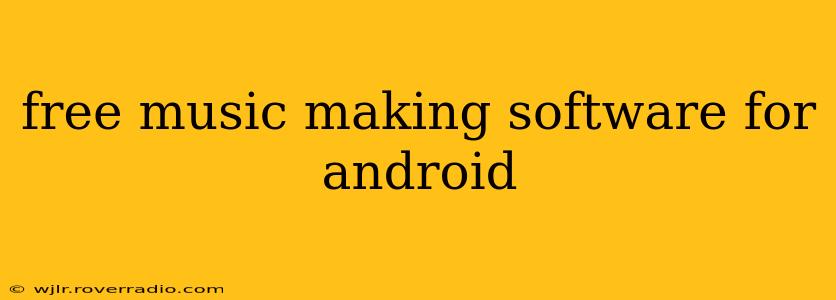The Android platform offers a surprisingly robust selection of free music making software, catering to everyone from budding beginners to seasoned musicians. Whether you're looking to create beats, compose melodies, or just experiment with sound, there's a free app out there for you. This guide explores some of the best options, helping you find the perfect tool to transform your Android device into a mobile music studio.
What are the best free music making apps for Android?
This is a question with many answers, as the "best" app depends heavily on your skill level, musical style, and desired outcome. However, some consistently highly-rated and feature-rich options include:
- GarageBand (iOS only - comparable Android alternatives discussed below): While not available on Android, its popularity highlights the demand for powerful, user-friendly music creation tools. Many Android apps strive to match its functionality.
- FL Studio Mobile: A mobile version of the popular desktop DAW (Digital Audio Workstation), FL Studio Mobile offers a powerful, albeit slightly complex, interface for creating professional-sounding tracks. While it offers in-app purchases, a significant amount of functionality is available for free.
- Caustic 3: Known for its virtual synthesizers and drum machines, Caustic 3 allows users to create complex arrangements with multiple instruments. It has a steeper learning curve than some other apps but provides impressive results.
- n-Track Studio: A multitrack recorder and DAW, n-Track Studio enables you to record audio, add effects, and mix your tracks. It's a solid choice for those focusing on recording and arranging rather than purely synthesizing sounds.
- BandLab: A collaborative platform with a built-in DAW, BandLab allows you to create, record, edit, and share music with others. Its social features make it a great choice for aspiring musicians looking for feedback and collaboration opportunities.
Which free music app is best for beginners?
For beginners, apps with intuitive interfaces and simpler workflows are ideal. While all the apps mentioned above can be learned, some offer gentler introductions to music production. BandLab is a strong contender here due to its ease of use and helpful tutorials. Many simpler apps focus on loop-based music creation, providing pre-made sounds and beats to arrange and customize. These can be excellent starting points for exploring musical composition without the complexities of virtual synthesizers or MIDI controllers.
Are there any free music apps with virtual instruments?
Yes, many of the free music apps listed above incorporate virtual instruments. Caustic 3, in particular, is known for its range of virtual synthesizers, drum machines, and samplers. FL Studio Mobile also features a robust selection of virtual instruments. Even simpler apps often include basic virtual instruments like keyboards and drum pads to help you get started.
Can I use free music apps to record my own vocals?
Most of the free DAWs (Digital Audio Workstations) mentioned, such as n-Track Studio and BandLab, allow you to record audio, including vocals. You'll need a decent microphone (even your phone's built-in microphone can work in a pinch), but these apps provide the tools to record, edit, and mix your vocal tracks into your compositions.
What are the limitations of free music making software?
While many free music apps offer impressive functionality, there are limitations:
- Limited features: Compared to paid versions or desktop DAWs, free apps often have fewer instruments, effects, and features.
- Watermarking or ads: Some free apps may include watermarks on exported audio or display ads.
- In-app purchases: While the core app might be free, many offer in-app purchases for additional sounds, instruments, or features.
Conclusion: Finding the Perfect Fit
The Android ecosystem offers a diverse range of free music making software, catering to all levels of experience. Experimenting with different apps is crucial to finding the perfect fit for your musical style and technical skills. Start with the beginner-friendly options, then gradually explore more advanced tools as your skills and confidence grow. Remember, the most important aspect is to enjoy the process of creating music!
